Campaigning for clean toilets and good cops: an interview with the SJC’s Axolile Notywala
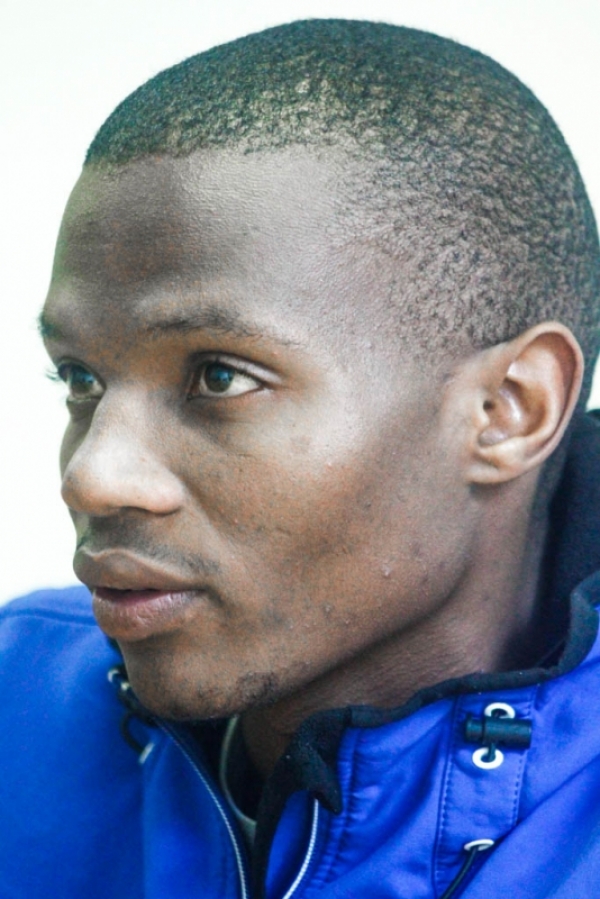
The Social Justice Coalition (SJC) has been at the forefront of two campaigns in recent years: improved toilet provision and better policing in Cape Town’s townships. GroundUp did an in-depth interview with the organisation’s Axolile Notywala.
The SJC launched in 2008 following the xenophobic violence that took place in Cape Town. The organisation’s initial purpose was to address the problems at the root of the violence. Notywala was just 19 when he joined a few months later. At the time he was studying Mechanical Engineering at the Cape Peninsula University of Technology. “My mode of transport was train. I’d get off at the Site B station and walk to Green Point [in Khayelitsha, not the neighbourhood next to Sea Point] where I stayed. I witnessed shops being raided and people being chased and wanted to do something. I didn’t know what to do or how to do anything. But then I was invited to an [SJC] branch meeting in Green Point. So I thought that was a platform where I could do something.”
Seven years later, Notywala is responsible for the SJC’s work with local government, which means dealing with the City of Cape Town’s officials and the mayor. He has written previously in GroundUp about the SJC’s analysis of the City’s budget. We decided to interview him.
GroundUp: How many members does the SJC have?
Notywala: We are still working on our membership system. We have twelve branches and between 10 to 30 members on average attend a branch meeting. There are some members who only attend events. So we have about 1,600 members, all in Khayelitsha. Most of our members are unemployed.
GroundUp: Your detractors have accused the SJC of being “white-led”?
Notywala: We have four white people working at the SJC. The majority of our staff are black people in Khayelitsha. The leadership of the SJC has two white people, the Deputy General Secretary and the Treasurer. The General Secretary is Phumeza Mlungwana who is a young black woman. The chairman is Nkosikhona Swartbooi who is also young and lives in Green Point, Khayelitsha. And so the leadership of the organisation is mainly black people living in the Khayelitsha. We have five elected people in our secretariat and we have 24 staff members. We’ve got a small but workable office in Site B, Khayelitsha.
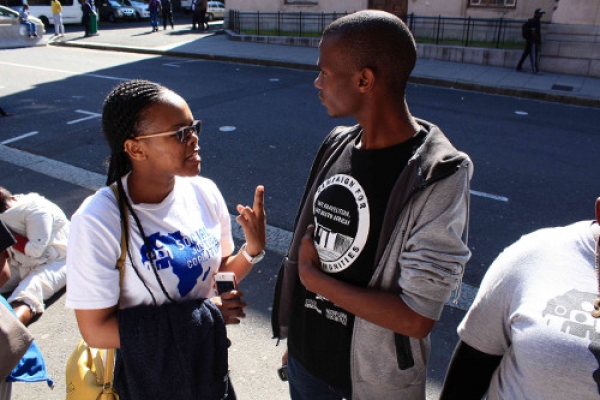 SJC General Secretary Phumeza Mlungwana and Notywala outside the Cape Town Magistrates’ Court where they were charged with convening an illegal gathering. Photo by Masixole Feni.
SJC General Secretary Phumeza Mlungwana and Notywala outside the Cape Town Magistrates’ Court where they were charged with convening an illegal gathering. Photo by Masixole Feni.
GroundUp: Sanitation has been the key focus of SJC. Arguably you were the first social movement to put sanitation at the top of your agenda. Why has sanitation been prioritised?
Notywala: At one point we ran a campaign for good governance and against the arms deal, but most of our members are from Khayelitsha and this campaign didn’t connect with the membership. So because some of the causes of xenophobia were due to frustration due to lack of service delivery, we wanted to do something that could connect with people, something that we thought could be achieved in the short to medium term, say five years. We called a big community meeting to discuss this, and we decided on sanitation. It speaks to lack of service delivery but also many safety issues in Khayelitsha.
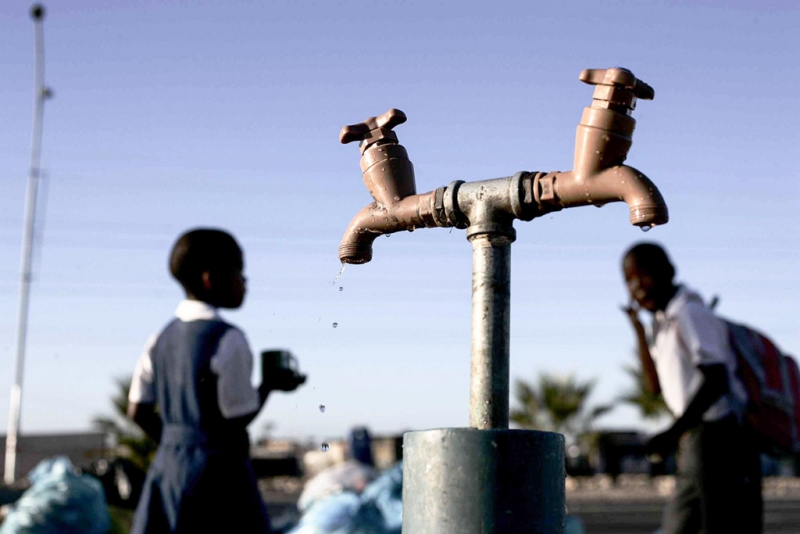 Photo by Masixole Feni.
Photo by Masixole Feni.
GroundUp: Has the sanitation campaign made progress?
Notywala: We’ve made some progress. We started working mainly in RR section, one of the poorest places in Khayelitsha. The way we approached the campaign was to look at existing facilities and look at maintenance. Once we see that existing facilities are working properly, we look at what services are needed for people who don’t have facilities.
We found the majority of flush toilets were blocked. The first things we campaigned for were the numbering of toilets [so that service could be better monitored] and a janitorial service. There are still problems with the janitorial service and there are still toilets that are blocked. But if you go to RR section now and compare it to 2009, you would see a big difference. The fact that sanitation now is being talked about everywhere is progress. No one wanted to talk about toilets then.
When we first talked with Mayor Dan Plato at the time he said there was no problem [with sanitation]. But when Mayor De Lille came in, she acknowledged there was a problem. But with time her attitude has changed.
“if you go to RR section now and compare it to 2009, you would see a big difference.”
GroundUp: Then along came Andile Lili and the faeces-throwers. Has that undermined your campaign?
Notywala: It has. Because a lot of people associate us with Ses’Khona. Raising issues the way they have, takes the focus away from the real issues. Because if you do what they do — throw faeces, burn tyres — that becomes the issue instead of the real issues. We have never raised issues in that way. But it has also highlighted the problems of sanitation. We agree with the issues they’ve raised, but it’s the methods, because the focus has moved onto the violent protests they have had.
GroundUp: What are the key problems with sanitation in Cape Town?
Notywala: The biggest one is that there’s no plan for people living in informal settlements. Provision is done on an ad-hoc basis. But people who have lived for more than 20 years in informal settlements don’t know what the future holds. Whether they’ll be moved, or what they’ll be provided with. Informal settlements are seen as temporary and therefore the focus is providing temporary sanitation facilities, where some of them have been provided for 10, 15 years, such as the Mshengu toilets. When you look at the budgets, the temporary solutions are even more expensive than installing flush toilets. Millions of rands are spent on facilities that are not used at times, and are also dangerous for people living in informal settlements.
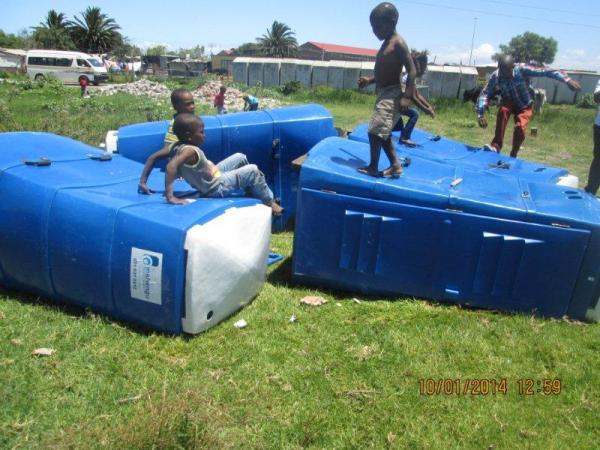
Children play on fallen Mshengu toilets. Photo by Axolile Notywala.
GroundUp: What are some of those dangers with these temporary solutions?
Notywala: Many people use the buckets — the City calls them containers — and Mshengu chemical toilets and the porta portas. These are a danger to health. The toilets often leak [outside], for example. There’s also the problem of safety, with people having to use bushes, and toilets being far away. So people are attacked or raped at night, or where there’s no proper lighting.
GroundUp: What are the problems with the way the City is managing the sanitation challenges?
Notywala: One of the biggest problems is that the City claims there is 100% access to sanitation services. This is based on a study done by the National Department of Water Affairs. We understand that the department came to the city and asked for figures, and on the basis of those figures, said the City is providing 100% access to sanitation. The South African Human Rights Commission has also questioned these numbers both from the City and National Government.
It’s difficult working in the Western Cape, which is led by the main opposition, but the majority of votes in Khayelitsha go to the ANC. So in Khayelitsha there’s mainly ANC ward councillors, and there’s fights between the ANC councillors and DA City politicians. So anything that comes out of Khayelitsha the DA sees as an attack on the DA by the ANC. And that’s a problem. And sometimes the ANC does use delivery issues to discredit the DA, and that’s a problem too. The same goes for the province. That’s one of the biggest challenges. And the DA is trying to keep its name clean by saying they’ve provided 100% services. Acknowledging that these problems exist should be the first step and that’s what the DA led province and City need to do in order to move forward and find ways of resolving them.
GroundUp: Does the SJC have an anti-DA agenda?
Notywala: We don’t have an anti-DA or anti-ANC agenda. The work we do with the police, they associate us with the DA. The work we do with sanitation, they associate us with the ANC.
GroundUp: You’re often criticised for focussing on Cape Town. Do you plan to move beyond Cape Town?
“The work we do with the police, they associate us with the DA. The work we do with sanitation, they associate us with the ANC.”
Notywala: Our members are based here and we focus here because these are issues that affect all of us personally. We know similar issues exist elsewhere in the country. Moving to other parts of the country is something we’ve discussed and thought about. But it’s not something we’re doing right now due to a few issues. One, if we do move to another city or province, we want to move with something that will work there. But we have had some small wins in Cape Town, and we are trying to replicate some of those successes with other organisations. For example, an organisation called Afesis-corplan in the Eastern Cape is considering doing social audits there. Planact is planning a social audit in Mpumalanga. We’ve worked with Equal Education who have already done a social audit in schools in Gauteng. That’s the kind of replication we’re doing. We’re trying to bring together different organisations interested in doing social audits, and we run workshops with them. But as an organisation we are not yet moving to other places. Our members are based here, and our work that we’ve done is not yet enough to take us elsewhere.
Even the policing issues we deal with affect everyone in the country and that’s a national government function so I am not really sure about the basis of the criticism.
GroundUp: What are social audits, because SJC has become associated with them?
Notywala: It’s a process that we’ve used to try and monitor spending and service delivery, and try to hold government to account. We’ve done three social audits, two on sanitation and one on refuse collection, in four different areas of Khayelitsha in each social audit. The idea originates from India. We’ve learned from organisations in India how they conduct social audits. We’re adapting them to local needs. We want communities to take the lead, and we will play a supportive role. We want to make sure that if communities find issues, they can take a lead and follow up on those issues and get government officials to account. For example, if there’s a toilet that’s not working, the community should be able to use the social audit to get the City to fix it.
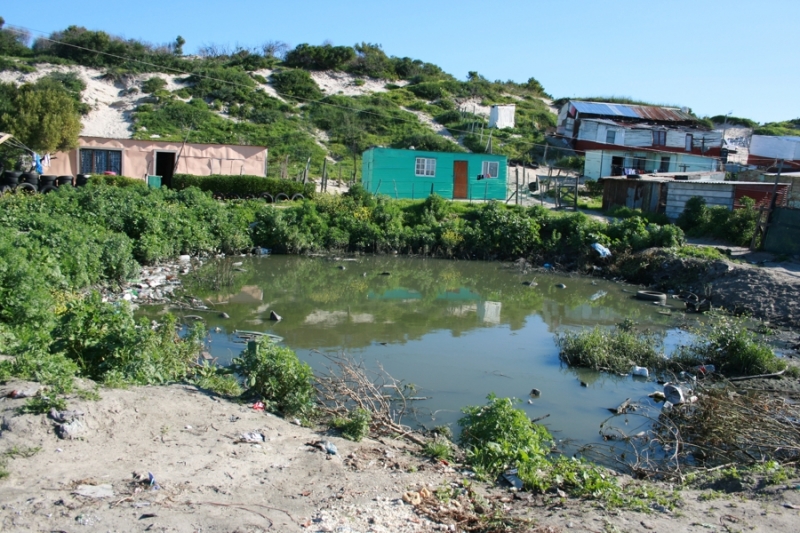
A waste water pool in Endlovini, Khayelitsha. Photo by Amelia Earnest.
GroundUp: The City has accused your audits of being methodologically flawed. Others have pointed out problems too. Do you agree with some of these criticisms. And if so are you intending to improve the methodology in future audits?
Notywala: Yes, we’ve been learning and we continue to learn as we go. We’ve done three, and they’ve improved. But we don’t agree with all the criticisms. We don’t want social audits to be seen as surveys. What is more important is the social part, the participation of people in the community. If we put more focus only on the questionnaires, then the real participation by people is taken away. We’re focussing on trying to get more community participation and leadership.
GroundUp: Are you finding the City difficult to co-operate with on sanitation?
Notywala: Over the last two years, it has been extremely difficult. When the mayor came into power we were all co-operating together, and that’s how the janitorial service started. That changed after the first social audit. When the social audit findings were presented the mayor responded with a press conference saying they would provide more portable toilets. Then Ses’ Khona took up this issue, saying they didn’t want portable toilets. And the relationship began changing at that point.
GroundUp: Do you agree with Ses’Khona that portable toilets aren’t the answer.
Notywala: No they’re not the answer. We completely agree with Ses’Khona on this. A lot of these sanitation technologies can work for a temporary period. We’re not saying everyone should get a flush toilet immediately. We know that it’ll take time. People might be in informal settlements for the next 30 to 50 years and that we have to acknowledge. However, government can not throw hands up and continue to provide temporary solutions. These solutions, like portable toilets, are temporary and should be treated as that. They shouldn’t be used for more than, say, six months. But they’re being used for years. Mshengu has had a contract for more than ten years in Khayelitsha. Places that were getting chemical toilets ten years ago are still getting them now.
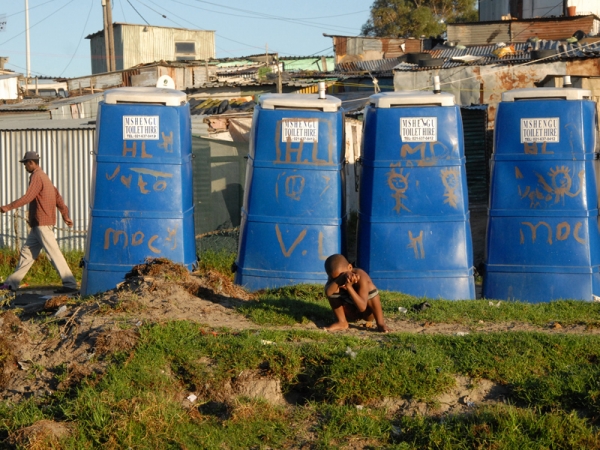 Photo by Masixole Feni.
Photo by Masixole Feni.
GroundUp: Moving onto policing, what did the Commission of Inquiry into policing in Khayelitsha achieve?
Notywala: It hasn’t achieved what it should have yet due to the failures of National Police Minister and the National Police Commissioner. But one of the best things that came out is the relationship we’ve developed with the police and other stakeholders in Khayelitsha. It also raised the issue of poor policing in Khayelitsha and other townships as well. But because only the national minister can implement most of the recommendations, nothing much has happened. The police officers in Khayelitsha can’t implement them. This affects not only the community, but the police themselves. For example the allocation of staffing resources.
GroundUp: What is the problem with police staffing?
Notywala: There’s a huge population in Khayelitsha but very few police personnel are provided. The top ten unsafest areas in Cape Town have one police officer for every 1,043 people. This includes areas such as Khayelitsha and Nyanga. The top ten safest areas have one police officer for every 178 people. This includes places such as the CBD and Rondebosch. The Khayelitsha police are overburdened and they don’t have enough resources to work on the issues they’re supposed to work on.
GroundUp: Have any of the commission’s recommendations been implemented?
Notywala: Attempts have been made by local SAPS. But the ignorance from the minister and the disregard from the national commissioner have made it impossible for local SAPS.
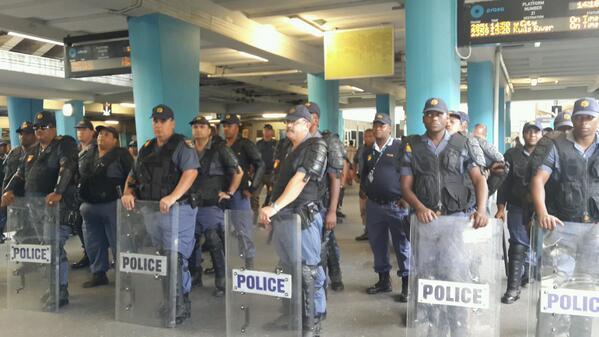 Photo courtesy of Equal Education.
Photo courtesy of Equal Education.
GroundUp: How is the current relationship between SJC and SAPS, or the Khayelitsha community and SAPS?
Notywala: We have a good relationship with local SAPS, such as the cluster commander Major General JJ Brand. He is one of the greatest police officers I’ve engaged with and I think I speak for a lot of SJC and Ndifuna Ukwazi colleagues who’ve worked with him. At each and every sub-forum there’s an SJC representative, and he is the one who initiated that.
GroundUp: What are the sub-forums?
Notywala: The sub-forums are where stakeholders look at different issues. So there’s a drug and liquor sub-forum, youth and gangs, an anti-vigilante one. There’s about eight of these sub-forums looking at different issues and they all meet together in a Joint Forum to discuss progress on dealing with these issues. It’s not just the SJC. Khayelitsha Development Forum, the City, the province and other Khayelitsha stakeholders are also involved and have a role to play.
GroundUp: How’s the SJC’s relationship with the Khayelitsha Development Forum?
Notywala: We’ve never really had a good working relationship. We invite them to some of our events. They were very critical of the commission when it was instituted, saying it was an attack on SAPS. I still don’t think they agree with what the commission did.
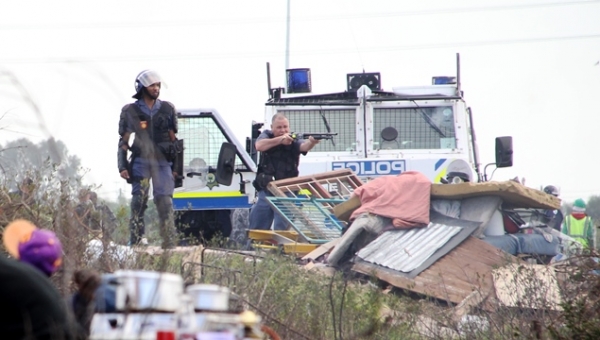
GroundUp: The national minister and commissioner have essentially rejected the recommendations of the commission. Where to from here?
We going to march on the 25th of August. We will sleep outside Parliament and deliver a memo to the National Minister. If we don’t get a response, we’ll take him to court, mainly on the resourcing issue.
“We will sleep outside Parliament and deliver a memo to the National Minister. If we don’t get a response, we’ll take him to court”
GroundUp: Are you finding the premier and provincial government co-operative and keen to improve things?
Notywala: They’ve been co-operative, by establishing the commission and the follow-up they’ve done. Although they’re engaged in some of the sub-forums, there are some issues they have to deal with, such as youth and gangs. There’s a recommendation [from the commission], [number] 12, for the provincial Department of Community Safety, that hasn’t been implemented yet.
This is again the political issue I explained earlier. Many people within the ANC and the alliance saw the commission as the premier’s thing. So it’s seen as a DA thing. The ANC sees it as an attack on the party itself. That’s a huge problem. We saw this around the 2014 elections. Next year is elections again, and we’re seeing the same party-political fighting.
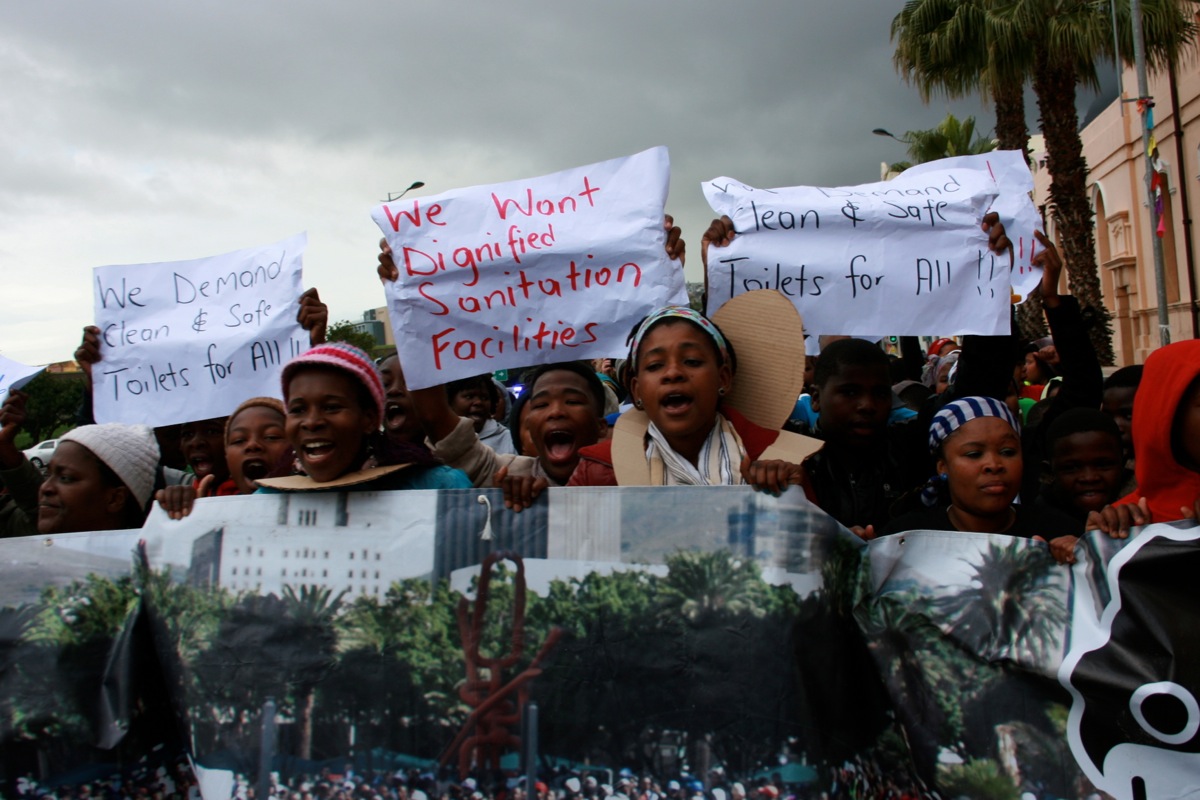 Demonstration for better sanitation. Photo by Amelia Earnest.
Demonstration for better sanitation. Photo by Amelia Earnest.

This article is licensed under a Creative Commons Attribution-NoDerivatives 4.0 International License.


